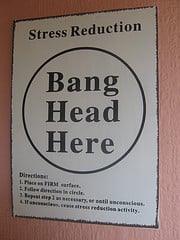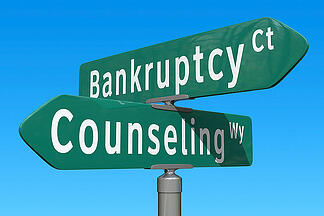New year, new year's resolutions. Don't you think it is about time for you to consider Debt Relief?

Sure, you say, but what is "Debt Relief"?
I'm talking here specifically about finally starting to take control of your unsecured debts...mainly credit card debt.
You've heard or read the statistics about how many individuals have too much credit card debt based on their income and living circumstances.
With credit card interest rates anywhere from 12%-24% or higher, if you are just making the minimum payments required, it could take you 10 years or more to finally pay off those debts!
Wouldn't it feel great to be DEBT FREE? OK, here are some tips that can really help if you will apply:
FIRST: Do you know exactly where you are financially? I mean, can you account for almost every dollar that comes in and for every dollar that goes out?
Most people have a vague idea, but have never taken the time to do a complete, thorough Financial Worksheet.
After completing a Financial Worksheet, I've had people say, "WOW, I had no idea that I was spending so much money on stuff like Starbucks, movies, burgers, etc."
Until you get a clear picture (and you may not like it) of where you really are, you cannot possibly make a plan to become Debt Free.
Here is a simply, easy-to-use Financial Worksheet that you can download:

SECOND: Now that you have a clear, honest (it won't help if you are not honest with yourself!) picute of where you are, it's time to get an up-to-date CREDIT REPORT.
You can get a FREE CREDIT REPORT annually that will tell you how much debt is being reported to the 3 Major Credit Bureaus (Equifax, TransUnion, Experian).
Not only will this report tell you to whom and how much debt you have, you may also discover that there are errors on the report. I've read reports that 1 out of 4 people have errors on their report.
If you find errors, you can file a challenge to each of the bureaus on line or you can mail a challenge.
The following links will help:
Equifax disputes
TransUnion disputes
Experian disputes
There is a very good site from the Federal Trade Commission that will give you some good points on for do-it-yourself credit repair.
OK, but how about all of the legitimate debts that is being reported?
Break them down into two basic groups:
Secured debts, such as:
- First Mortgage loans
- Second Mortgare or Equity Line of Credits
- Auto, boat, RV loans
- Government Student Loans
There is not a lot you an do about these except keep paying.
But on the other hand, all of the UNSECURED LOANS, such as:
- Credit Cards
- Store Cards
- Personal loans
- Mecical bills
- Pay Day loans
- Private Student Loans
You do have options as to how to repay these...read on.
NEXT... List all of the unsecured loans like this:
Creditor, Interest Rate, Payment (minimum), Balance
Here is where the Financial Worksheet is so important.
After completing the Financial Worksheet, you will be in one of the following groups:
After all bills (including all debts) are paid, I have $100 - $200 extra each month that could be used to start paying down unsecured debt.
You find out that you are basically even at the end of the month. You are paying all bills (including all debts) and you have basically $0 left over, but not negative.
Finally, if after completing a thorough Financial Worksheet, you realize that you are coming out negative at the end of the month.
You probably alreaday knew this, as you have been "robbing Peter to pay Paul" for a long time. In fact, some, if not all of your unsecured debts are 30,60 or 90 days late and some, if not all, have been charged off and gone to a Debt Collection Agency.
Here are your options, based on your personal financial situation (revealed from the Financial Worksheet and Credit Reports):
Group One... Those of you who can put an extra $100-$200 towards paying down unsecured debts.
You should use a SNOWBALL PLAN to pay off those unsecure debts a lot sooner and at the same time, save you thousands of dollars in interest!
Basically, you break down your unsecured debts and start paying extra to the one with the lowest balance.
After this one is paid off, you use the same extra, plus the minimum payment just paid off plus the minimum payment due on the second and put all of that towards that second debt.
For a more complete overview, click here.
But what about Group 2? You are making all of your payments, but there is just not anything left over?
You should be able to qualify for a DEBT MANAGEMENT PROGRAM.
- In a Debt Management Program, you will have one monthly payment that will be disbursed to each of your creditors by a Debt Management Company.
- Your interest rates should be reduced significantly.
- Late fees and over-the-limit fees should be stopped or forgiven.
In short, a Debt Management Program can not only help you become Debt Free in a shorter amount of time (usually about 48 months), but save you thousands of dollars in interest and fees.
Finally, what about Group 3? Those of you who have too much unsecured debt and are not only not getting anywhere but really can't afford your payments...here are your choices:
- DEBT SETTLEMENT
- BANKRUPTCY
Debt Settlement is a great way to pay off/settle your unsecure debts without having to resort to bankrutpcy.
Debt Settlement will allow you to have:
- One Monthly Payment (usually much lower than the required total minimum payments now)
- Your Debt can be settled at 50% or lower (depending on several factors)
- You can be DEBT FREE in about 48 months.
To receive a FREE REPORT called DEBT SETTLEMENT FOR BEGINNERS, click below:
But if you cannot even afford the reduced payment of a Debt Settlement Program, then you should consider BANKRUPTCY as a way to not only cancel your unsecured debts, but relieve the constant finacial pressure and worry that comes from such a severe financial condition.
You should consult a Bankruptcy Attorney who specializes in Bankruptcy. You should be able to schedule a Free Consultation to deteremine if you qualify.
Regardless of your situation, there is a way to not only become Debt Free, but stop the collection calls and relieve the constanct pressure that comes with too much debt.
Photo By: Eamon Curry








 If you live in Oregon, I've got some good news on how you can find debt relief!
If you live in Oregon, I've got some good news on how you can find debt relief! Confused about Debt Settlement? Here are some easy to understand, basic information about debt settlement that will help.
Confused about Debt Settlement? Here are some easy to understand, basic information about debt settlement that will help. When you have too much credit card debt, you only have a few options.
When you have too much credit card debt, you only have a few options.  One of the most commonly asked question we get here at Debt Relief NW, Inc. is…
One of the most commonly asked question we get here at Debt Relief NW, Inc. is…



